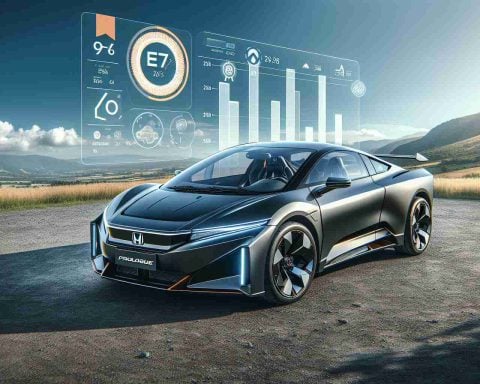- A group of Republican senators proposes legislation to remove tax incentives for electric vehicles (EVs), questioning their benefit to average consumers.
- The Eliminating Lavish Incentives to Electric (ELITE) Vehicles Act seeks to eradicate the $7,500 tax credit for new EVs and $4,000 for used ones.
- Another bill proposes a $1,000 tax on EV purchases to compensate for the lack of traditional gas tax contributions.
- The debate highlights tensions between supporting clean energy innovation and maintaining traditional revenue models.
- Oil and gas industry contributions to lawmakers are viewed as a factor influencing the proposed legislation.
- This situation reflects a deeper clash of values regarding technological advancement versus existing economic structures.
In the buzzing halls of Capitol Hill, a new front emerges in the ongoing battle over America’s energy future. An alliance of Republican senators has fired a volley at electric vehicles (EVs), threatening to dismantle incentives designed to propel them into the mainstream.
The Eliminating Lavish Incentives to Electric (ELITE) Vehicles Act, led by Senator John Barrasso, aims to eliminate the $7,500 tax credit for new EVs and a $4,000 boost for used ones. The rhetoric casts EVs as the toys of wealthy elites, sparking questions about who really benefits from existing incentives.
This legislative push arrives alongside another proposed bill that aims to impose a $1,000 tax on EV purchases. Senators argue this compensates for the absence of a traditional gas tax, suggesting that these battery-powered vehicles contribute to road and bridge wear without paying for repairs.
The narrative seems clear: EVs, with their svelte modernity, stand accused of bypassing the fiscal responsibilities that come with motoring. Yet behind these bills loom the shadowy figures of campaign contributions; the oil and gas industry stands as a potent benefactor to the bills’ proponents.
As the world shifts gears towards cleaner energy, the key question lingers: Should the road to a greener future be paved with the sacrifice of traditional revenue models, or do these adjustments mask deeper motivations?
This legislative battle represents more than policy adjustments; it highlights a profound clash of values. Will America choose incentives that bolster technological innovation and environmental stewardship, or is the status quo too entrenched to yield? The road ahead, fraught with political potholes, might see some bold navigation.
Are EV Incentives Driving America Off Course?
How-To Steps & Life Hacks for Maximizing EV Incentives
1. Timing Your Purchase: To maximize the benefit, consider purchasing an EV when tax credits are still available. Keep abreast of legislation changes that might affect these perks.
2. Explore State-Level Benefits: In addition to federal tax credits, many states offer additional incentives, such as rebates, carpool lane access, and reduced registration fees. Check local government websites for current offerings.
3. Leverage Used EV Credits: If the goal is affordability, quality used EVs might qualify for a $4,000 tax credit, making them an attractive option for budget-conscious consumers exploring cleaner energy alternatives.
Real-World Use Cases of EVs
Electric vehicles are increasingly popular in urban areas, thanks to lower emissions and costs compared to traditional vehicles. Businesses with delivery fleets appreciate EVs for predictable energy costs and reduced maintenance expenses. Additionally, EVs are gaining traction in ride-sharing and public transit sectors, furthering sustainable urban mobility.
Market Forecasts & Industry Trends
The global EV market is expected to grow exponentially, driven by advancements in battery technology and increased public and private investments in charging infrastructure. The International Energy Agency forecasts that EVs could represent 30% of vehicle sales by 2030, compared to 4% in 2022. The growth is bolstered by significant investments from automakers such as Tesla, Ford, and General Motors.
Reviews & Comparisons
EVs are often praised for their quiet operation, lower running costs, and acceleration capabilities. Compared to traditional internal combustion engines, they may have higher purchase costs but lower lifetime ownership expenses. Comparisons frequently emphasize the benefits of EVs in urban driving settings but note limited driving range as a disadvantage for long trips without adequate charging infrastructure.
Controversies & Limitations
Critics of EV incentives argue that they mostly benefit affluent buyers who can afford new technology and that EVs do not currently pay into traditional road maintenance funds. Moreover, reliance on lithium and other rare earth metals has ecological and ethical implications, such as environmental degradation and labor issues at mining sites.
Features, Specs & Pricing
Modern EVs boast features like regenerative braking, advanced driver-assistance systems, and seamless connectivity. Specs vary greatly, from around 100 miles of range for more economical options to upwards of 400 miles for high-end models. Entry-level EVs start at approximately $30,000, while premium models can exceed $100,000.
Security & Sustainability
EVs provide unique opportunities for enhancing grid resilience through vehicle-to-grid technology, which allows vehicles to return electricity to the grid during peak demand. However, their production involves significant carbon emissions, primarily from battery production. Efforts to recycle batteries and source materials responsibly are crucial to improving sustainability.
Insights & Predictions
As battery technology improves and production costs decline, the adoption of EVs is predicted to accelerate. Governments worldwide are likely to continue incentivizing EVs, although the nature of these incentives may evolve to address critiques and complement infrastructure funding.
Pros & Cons Overview
Pros:
– Lower emissions and environmental impact.
– Reduced fuel and maintenance costs.
– Quiet and responsive driving experience.
Cons:
– High initial purchase cost.
– Limited range and charging infrastructure in some areas.
– Dependency on scarce minerals for battery production.
Actionable Recommendations
– Stay Informed: Keep up-to-date with policy changes regarding EV incentives, as they can substantially impact total ownership costs.
– Evaluate Total Cost of Ownership: Factor in federal and state incentives, fuel savings, and maintenance costs when considering an EV purchase.
– Plan for Charging Needs: Assess your driving habits and ensure access to reliable charging infrastructure, both at home and along frequently traveled routes.
For more on sustainable transportation, visit NRDC.


















